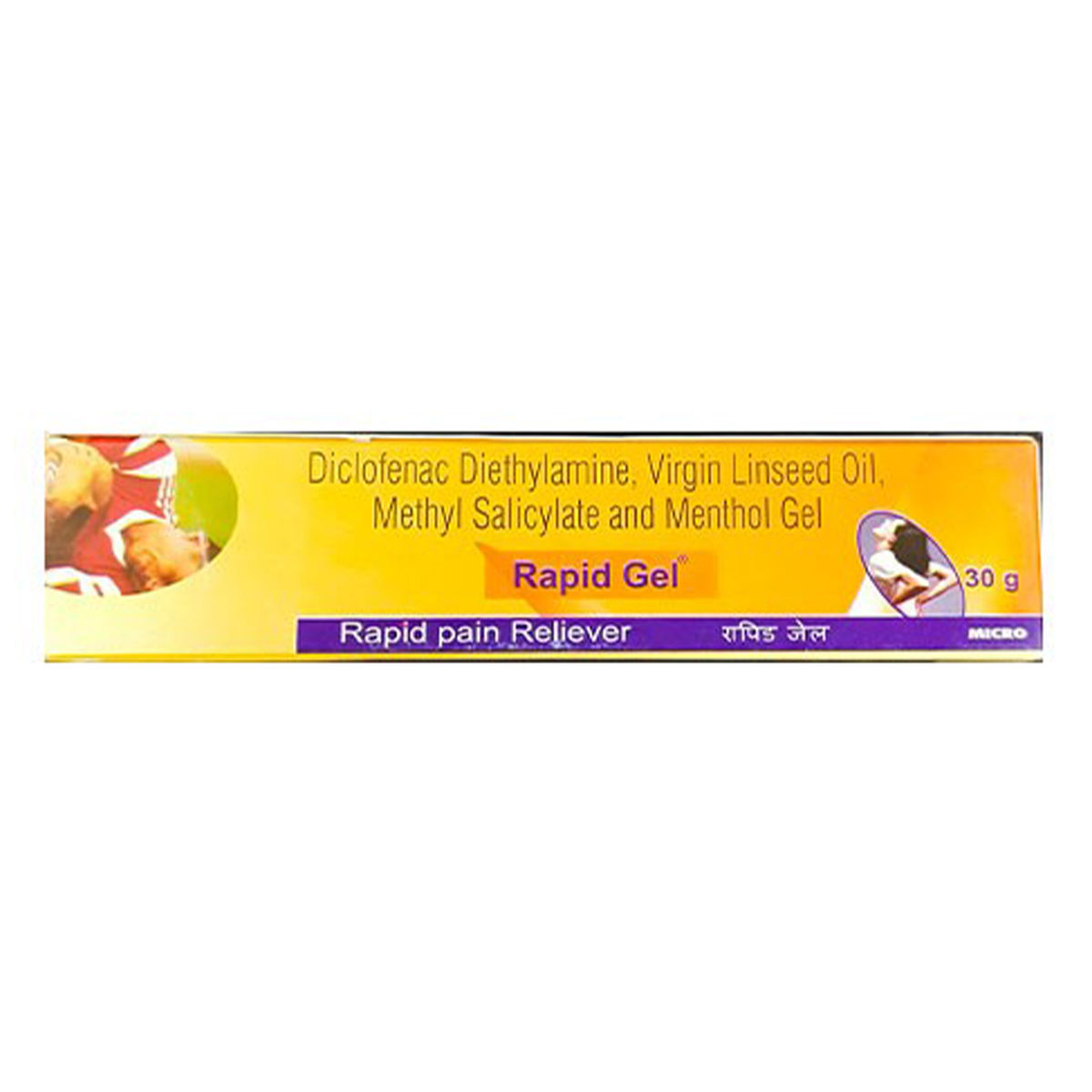Dicloquick Gel 30 gm
₹97.2*
MRP ₹108
10% off
₹91.8*
MRP ₹108
15% CB
₹16.2 cashback(15%)
Free Delivery
With Circle membership
(Inclusive of all Taxes)
This offer price is valid on orders above ₹800. Apply coupon PHARMA10/PHARMA18 (excluding restricted items)
Know Your Delivery Time
Provide Delivery Location


Secure Payment

India's Most Trusted Pharmacy

Genuine Products
Manufacturer/Marketer :
Consume Type :
Return Policy :
Expires on or after :
About Dicloquick Gel
Dicloquick Gel is used to relieve acute musculoskeletal pain and pain of osteoarthritis of joints. It reduces pain, swelling, and joint stiffness, thereby improving your ability to move and flex the joint.
Dicloquick Gel contains Diclofenac and Methyl salicylate (as a pain killer), Linseed oil (as an anti-inflammatory), and Menthol (as a cooling agent). Dicloquick Gel works by first cooling the skin and then warming it up, which interferes with the pain signal transmission through nerves. Together Dicloquick Gel works by blocking the release of chemical messengers that causes pain and inflammation with redness and swelling.
Dicloquick Gel should only be used if advised by your doctor. Dicloquick Gel should be used for skin only, and accidentally if it gets into your eye, mouth, or nose, rinse with water. Dicloquick Gel should be applied to the affected area with a piece of clean cotton wool or gauze swab. Dicloquick Gel should not be applied more than the recommended dose to avoid unpleasant side effects. Some common side effects of Dicloquick Gel are burning, itching, redness, stinging, and dryness on your skin in the place where Dicloquick Gel is applied. These side effects are usually mild and short-lived. However, if the side effects are persistent, reach out to your doctor.
Dicloquick Gel is contraindicated in children below two years of age. Besides this, caution must be exercised when older children (2-12 years) are treated. Children affected with viral flu, chickenpox, or viral fever should avoid using Dicloquick Gel as it contains methyl salicylate may induce Reyes Syndrome (swelling in the liver and brain).
Uses of Dicloquick Gel
Directions for Use
Medicinal Benefits
Dicloquick Gel contains Diclofenac and Methyl salicylate (as a pain killer), Linseed oil (as an anti-inflammatory), and Menthol (as a cooling agent). Dicloquick Gel works by first cooling the skin and warming it up, interfering with the pain signal transmission through nerves. Together Dicloquick Gel works by blocking the release of chemical messengers that causes pain and inflammation with redness and swelling.
Side Effects of Dicloquick Gel
- Skin irritation
- Contact dermatitis
- Rash
- Itching
- Redness
- Swelling
- Burning or stinging sensation
Storage
Drug Warnings
Before using Dicloquick Gel, tell your doctor if you are allergic to Dicloquick Gel other pain killers (like ibuprofen, naproxen, celecoxib) or if you have any other allergies. Use of Dicloquick Gel is contraindicated in the people who have asthma, liver disease, kidney disease, stomach/intestine problems (bleeding, ulcers, Crohn's disease), cardiovascular diseases (heart attack, high blood pressure, stroke), swelling (oedema, fluid retention), blood disorders (such as anaemia), bleeding/clotting problems. Dicloquick Gel should not be given to children less than 2 years of age. The use of Dicloquick Gel should be done with caution in the elderly as they have a high risk of kidney damage and gastrointestinal bleeding.
Therapeutic Class
Drug-Drug Interactions Checker List
- CAPTOPRIL
- LISINOPRIL
- LOSARTAN
- VALSARTAN
- CIDOFOVIR
- DEXAMETHASONE
- PREDNISONE
- LITHIUM
- METHOTREXATE
- FUROSEMIDE
Habit Forming
How Dicloquick Gel Works
What if I have taken an overdose of Dicloquick Gel
Alcohol
Caution
It is best to avoid alcohol while using the medication as its use with Dicloquick Gel might increase the chance of gastrointestinal bleeding.
Pregnancy
Safe if prescribed
It is advisable to consult a doctor before using it.
Breast Feeding
Safe if prescribed
Safety for use of Dicloquick Gel in lactation is not known, hence its benefit should be weighed against the possible risks to the mother and child.
Driving
Safe if prescribed
Dicloquick Gel has no or negligible influence on the ability to drive or use machines.
Liver
Safe if prescribed
Dicloquick Gel does not have any reported interaction. However, in severe liver diseases, the lowest effective dose should be used for the shortest duration possible.
Kidney
Caution
No information is available on the efficacy and safety of Dicloquick Gel in patients with advanced kidney disease. Hence, treatment with Dicloquick Gel is not recommended in patients with advanced kidney disease. If Dicloquick Gel is used in this case then, close monitoring of the patient's kidney function is advisable.
Children
Caution
Dicloquick Gel is contraindicated in infants below 2 years of age. Please consult your doctor for advice before using Dicloquick Gel.
Country of origin
Author Details
We provide you with authentic, trustworthy and relevant information
Dicloquick Gel Substitute

Etolgia-TH Gel 30 gm
₹6.92per tabletFrizpain Nano Gel 30 gm
by AYUR
₹4.20per tabletRapid Gel 30 gm
₹3.68per tabletDofaq 30Gm Gel
by AYUR
₹4.05per tabletDan Gel 75 gm
₹1.57per tablet
FAQs
Disclaimer
Product Substitutes





















